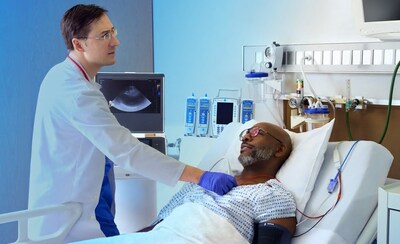New Montefiore Einstein Research Published in The Lancet Respiratory Medicine Emphasizes Importance of Multi-Faceted, Symptom-Focused Treatment Strategy for Critically Ill Patients
BRONX, N.Y., Oct. 11, 2025 /PRNewswire/ — In the U.S., more than 5 million people are admitted to Intensive Care Units (ICUs) each year for the treatment of acute or life-threatening medical problems. Mechanical ventilation, when a machine moves air into and out of the lungs of people experiencing acute respiratory distress, is a crucial form of life support provided to more than 300,000 patients annually in the ICU. New research published in The Lancet Respiratory Medicine shows that in a cohort of more than 10,000 people, patients who received a high proportion of deep sedation while mechanically ventilated had a greater risk of adverse discharge – losing their ability to live independently – compared to patients who did not receive deep sedation.
Good Intentions Lead to Unintended Harm
Deep sedation – when medications keep patients from being fully conscious and not easily aroused – is commonly used in ICUs across the country with the aim of preventing ventilated patients from experiencing emotional distress and/or pain during their critical recovery. Since the COVID-19 pandemic, the use of deep sedation has become more common practice in ICUs nationwide. The problem is that when a patient is deeply sedated, it inhibits them from being able to move their bodies, causing unintended harm. Findings from investigators in the Department of Anesthesiology at Montefiore Einstein suggest that patients who received targeted, symptom-focused treatments with non-opioid medications, instead of deep sedation, had higher rates of independent living after being discharged from the hospital.
“In this study, we found sedative medications were more likely to be delivered to patients to aid with sleep and rest, however use of sedative medications can actually strip the exhausted patient of the healthy restorative sleep they need most during illness,” said author Matthias Eikermann M.D., Francis F. Foldes Professor and Chair, Department of Anesthesiology at Montefiore Einstein. “Our data shows this lack of quality sleep leads to greater rates of immobility in the ICU, which compounds into even more delirium and greater loss of the muscles and nerves needed during recovery.”
With evidence from this study, the Department of Anesthesiology spearheaded the creation of a system-wide Mobilization Committee including the departments of Anesthesiology, Medicine, and Rehabilitation Medicine (including physical therapy, and respiratory therapy teams) and nursing, with the goal of reducing the use of deep sedation and increasing early mobilization in the ICUs. This multidisciplinary group will conduct targeted rounds in the ICUs to identify barriers to early mobilization and develop strategies to implement patient-centered interventions. Efforts are supported by a digital patient board in Montefiore Einstein’s electronic record system to track these newly developed protocols and a new Surgical ICU Order Set to ensure clinicians have the tools needed to identify alternative pain treatments.
By deploying a new symptom-focused treatment strategy, Montefiore Einstein investigators believe that providers will be able to more comprehensively evaluate patients and recognize symptoms of emotional distress, treating them accordingly with antipsychotics or non-opioid analgesics.
“Our hope is that the data published in this investigation will fuel national efforts to improve education about deep sedation and adherence to evidence-based guidelines,” said Dr. Eikermann. “The ultimate goal is to enhance overall patient care and help people return to the lives they want to live with their loved ones.”
About Montefiore Health System
Montefiore Health System is one of New York’s premier academic health systems. It is a recognized leader in providing exceptional quality and personalized, accountable care to approximately three million people in communities across the Bronx, Westchester, and the Hudson Valley. It comprises ten hospitals, including the Children’s Hospital at Montefiore, Burke Rehabilitation Hospital, and over two hundred outpatient ambulatory care sites. The advanced clinical and translational research at its medical school, Albert Einstein College of Medicine, directly informs patient care and improves outcomes. From the Montefiore-Einstein Centers of Excellence in cancer, cardiology and vascular care, pediatrics, and transplantation, to its preeminent school-based health program, Montefiore is a fully integrated healthcare delivery system providing coordinated, comprehensive care to patients and their families. For more information, please visit www.montefiore.org. Follow us on Twitter, Instagram, and LinkedIn, or view us on Facebook and YouTube
About Albert Einstein College of Medicine
Albert Einstein College of Medicine is one of the nation’s premier centers for research, medical education and clinical investigation. During the 2024-25 academic year, Einstein is home to 712 M.D. students, 226 Ph.D. students, 112 students in the combined M.D./Ph.D. program, and approximately 250 postdoctoral research fellows. The College of Medicine has more than 2,000 full-time faculty members located on the main campus and at its clinical affiliates. In 2024, Einstein received more than $192 million in awards from the National Institutes of Health. This includes the funding of major research centers at Einstein in cancer, aging, intellectual development disorders, diabetes, clinical and translational research, liver disease, and AIDS. Other areas where the College of Medicine is concentrating its efforts include developmental brain research, neuroscience, cardiac disease, and initiatives to reduce and eliminate ethnic and racial health disparities. Its partnership with Montefiore, the University Hospital and academic medical center for Einstein, advances clinical and translational research to accelerate the pace at which new discoveries become the treatments and therapies that benefit patients. For more information, please visit einsteinmed.edu, follow us on Twitter, Facebook, Instagram, LinkedIn, and view us on YouTube.
![]() View original content to download multimedia:https://www.prnewswire.com/news-releases/people-who-receive-less-sedation-when-ventilator-dependent-more-likely-to-return-to-independent-living-after-hospitalization-302580113.html
View original content to download multimedia:https://www.prnewswire.com/news-releases/people-who-receive-less-sedation-when-ventilator-dependent-more-likely-to-return-to-independent-living-after-hospitalization-302580113.html
SOURCE Montefiore Health System




